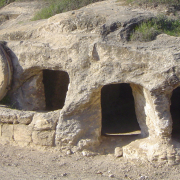Does Christian Antisemitism Disprove Jesus as Messiah?
If the Messiah is supposed to end antisemitism, make all wars cease, and establish God’s kingdom on earth, then how can Yeshua (Jesus) be the Messiah? His followers have perpetrated antisemitism for centuries, have initiated countless wars, and Yeshua even said his “kingdom is not of this world.” He might have claimed to be the Messiah, but he’s not the Messiah we’re looking for. Thanks, but we Jewish people will pass. Or so goes the common refrain. It could be put in argument form as follows:
- Messiah will end antisemitism and suffering permanently.
- Jesus claimed to be Messiah.
- Jesus did not end antisemitism and suffering.
- Therefore, Jesus is not the Messiah.
Now, I don’t deny the first three premises of the argument. Each one is true. However, the conclusion, number four, does not follow from the premises.
Let me illustrate why. Consider Moses. He was the promised redeemer of Israel, the one appointed by God to rescue the children of Israel from the bondage of Egyptian slavery. When, it could be asked, did Moses begin this rescue? Did he oppose Pharaoh to his face while he was living in Pharaoh’s household as a teenager? No. Did he argue for his people’s freedom as a young man? No again. In fact, he fled Egypt without accomplishing anything, escaping to Midian to live for decades away from his fellow Israelites (Exod 2:15). Moses did not even attempt to rescue Israel from slavery until he was eighty years old (Exod 7:7)!
Put yourself in the shoes of one of Moses’s childhood friends. You and he are now, say, sixty years old. You’re in agony making bricks in the hot sun all day. What would you think if someone told you that Moses was the redeemer of Israel? You would likely scoff at the idea. Moses? The privileged Hebrew who abandoned his people decades ago? No, he couldn’t be the one. You could even put it in argument form:
- God will send a redeemer to rescue his people from slavery, as he had promised (Gen 50:24).
- Moses is claimed to be the redeemer.
- Moses did not rescue his people from slavery but rather abandoned them for decades.
- Therefore, Moses is not the redeemer of Israel.
Just as previously, the first three premises are correct, but the conclusion is wrong. Perhaps you can see why now. When Moses was sixty years old, his mission to rescue Israel had not even begun. But, in just twenty years, that same Moses would return to his people, boldly confront Pharaoh, and would rescue Israel from her oppressors. All that was prophesied about him would come to pass, even though it didn’t look like it beforehand.
So too with Yeshua. His mission to rescue Israel from her bondage has not yet begun. He’s out in Midian, awaiting his Father’s call to return to Israel. And when he returns, he will deal decisively with the enemies of the Jewish people. Yes, just as you expect: no more antisemitism, no more wars, peace on earth, and Israel restored to a place of prominence just as has been prophesied (Deut 28:13; Isa 11). Israel will be the head, and not the tail, when Yeshua reigns on his father David’s throne in Jerusalem.
So, I’ve argued that the presence of antisemitism today—just as the presence of Israel’s slavery when Moses was sixty years old—does not negate Yeshua’s credentials as the Messiah of Israel.
Christian Antisemitism in the Mix
But what about the ugly fact that so many of Yeshua’s followers participated in antisemitic actions for centuries? That’s like a bunch of Pharaoh’s goons saying they are “Moses-ians” while whipping their Hebrew slaves. Doesn’t that, too, challenge this notion that Yeshua is Messiah?
Not necessarily. Let’s play this out. What if, in a hypothetical situation, those Egyptian goons were devoted to “Moses” because they had heard that he was a powerful Egyptian who was legendary for his vigilante justice? If you recall, just before Moses fled Egypt, he singlehandedly killed a man and buried the body (Exod 2:12). Rumors spread (Exod 2:14). What if the Egyptians were unaware that Moses killed an Egyptian and angered Pharaoh? What if “Moses the symbol of brutality” was born in the minds of the Egyptians, and they applauded him for it? Perhaps they ignored Moses’s Hebrew identity and emphasized him as a symbol of Pharaoh’s house, where he grew up. What if this was the Moses the Egyptians cited when they called themselves “Mosesians”? What if, through some twist of logic, they thought they were following in Moses’s footsteps by being brutal to Hebrew slaves? Surely, the real Moses would be horrorstruck that his supposed followers were mistreating his brothers and sisters.
So too with Yeshua. He never, ever, advocated the hatred and persecution of his Jewish brothers and sisters. Yeshua affirmed, rather than rejected, the chosenness of the Jewish people. He promoted non‑violence and called for a fulfillment of God’s covenantal promises to Israel. Yeshua’s earliest followers were themselves Jewish. The first communities of Yeshua-followers were composed largely of Jews who continued to observe the Torah while proclaiming that Yeshua had fulfilled Jewish messianic expectations. The New Testament letters of Paul repeatedly emphasize that God’s promises to Abraham endure through the Jewish people.
So what went wrong? The answer lies largely in the dynamics of power rather than what Yeshua actually said and did. First, the destruction of Jerusalem in 70 CE, and the Roman victories over the Jewish people in 135 CE, were interpreted by Gentile Christians as God’s final judgment against the Jewish people. It did not matter what warmth Yeshua and the Jewish apostles had toward their people a century prior; in many Gentile Christians’ minds, the smoldering ash heap on the Temple Mount spoke louder than the New Testament. This anti-Jewish idea—supposedly proved by Jerusalem’s downfall—led more and more Gentile Christians to develop an anti-Jewish theology.
Once these Gentile Christians obtained political dominance in the fourth century, the temptation to use state mechanisms to enforce religious conformity grew strong. With the power of the Empire behind them, this created opportunities for coercion that had no precedent in the early church.
And in so doing, Yeshua was reimagined in their own image, as an anti-Hebrew, not a Hebrew himself. But this was not the Jewish Jesus who lived in Judea. Many Christians have come to realize this, rejecting all antisemitism.
Thus, Christian antisemitism—by no means supported by vast numbers of Christians—is better understood as a historical deviation rather than an essential feature of belief in Yeshua.
The existence of such a deviation does not negate the possibility that Yeshua is the Messiah. A messianic claim must be evaluated on its own merits: fulfillment of prophetic criteria, consistency with scriptural expectations, and the transformative impact of his life and message. Moses fit all those criteria to be Israel’s redeemer from Egypt; Yeshua fits the criteria as Israel’s redeemer from sin and guilt. That’s what he came to do on his first visit; a glorious restoration for Israel and the nations awaits his return.






 Brian Crawford
Brian Crawford
